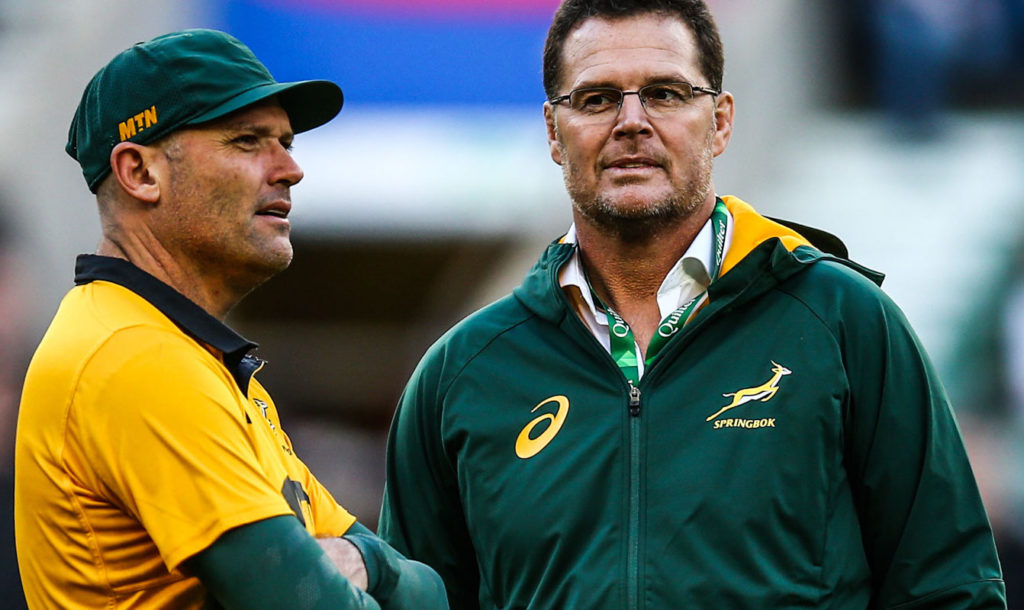While defence guru Jacques Nienaber is head coach of a Bok team renowned for pragmatism, the touring British & Irish Lions should anticipate a few surprises, writes ANDRE-PIERRE CRONJE.
READ: IRFU thwarts Pieter-Steph’s Munster move
We all know the blueprint for Springbok rugby by now. A colossal forward pack to bully and strangulate the opposition, a tactician at No 9 to direct the play, a flyhalf that’s more boot than man, a big ball-carrier at inside centre, and deadly pace out wide.
All of the most successful Springbok sides have used this blueprint and their gameplan remained largely the same: Be ruthless in defence. Utilise a superior pack to dismantle opposition set piece. Attack the breakdowns to force penalties. Take the points when they’re on offer. Rinse and repeat.
It’s a gameplan that is beautiful in its efficiency. It is uncomplicated and uncompromising, a fitting extension of the South African rugby psyche. There are very few moving parts or intricacies – for the most part, what you see is what you get.
Going into the 2019 Rugby World Cup final against England, there was endless media speculation about how the Boks would look to alter this gameplan. How they might deviate from it after only narrowly overcoming Wales in the semi-final.
The consensus was that England, under the guidance of the master of mind games, Eddie Jones, would have plans aplenty to counter the Springboks’ rudimentary crash-and-bash style rugby. The men in green and gold would be forced to think outside the box if they wanted to beat England.
It was, therefore, a surprise to many when Rassie Erasmus stated that there would be no change in tactical approach for the final. The Boks would play the same rugby that had brought them that far in the competition. The same rugby that had beaten New Zealand in New Zealand (the first side to do so in nearly a decade).
Erasmus’ comments were reminiscent of Aussie spin-bowling great Shane Warne, who would tell batsmen exactly which type of delivery he was about to bowl them out with. No surprises, just be good enough to counter it. England weren’t.
With the British & Irish Lions series looming, there is about a snowball’s chance in hell that Erasmus and Nienaber are going to rip up the blueprint now and start over. The forward-orientated, nuts-and-bolts, belts-and-braces style of play will continue.
However, although pragmatism may be the name of the game, it would be unwise to think the Springboks of 2021 are going to be a carbon copy of 2019’s iteration. For a start, Nienaber has been elevated to the position of head coach. He’ll bring his own ideas to the role and this could be reflected in subtle changes to the side.
Despite the World Cup victory, South Africa are not the finished article. Especially not with regard to their attacking shape. Since 2018 there has been steady progress in developing this facet of the game. Gradually building in variations and making use of players such as Cheslin Kolbe and Willie le Roux to systematically break down defences. Expect this to continue for the Lions series.
The impact of playing the series in South Africa should also not be understated. In the Erasmus era, the Boks have averaged 28 points a match when playing at home, 31 on the Highveld. In doing so, they have scored on average more than three tries per game. It is clear, that in home conditions the Springboks have a bit more bite in their attacking play.
Erasmus and Nienaber are shrewd operators. The Covid-19-enforced absence of the Springboks from the international scene will not have hampered the plotting of South Africa’s chief strategists. Though 90% of the South African gameplan will remain the same as it has always been, within the remaining 10% there is plenty of scope for cloak-and-dagger tactics.
Warren Gatland will need to be wary of this element of unpredictability. After all, sometimes Shane Warne lied about which delivery he was going to bowl …




